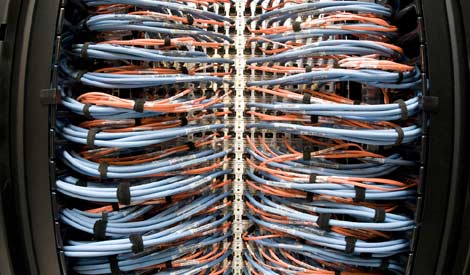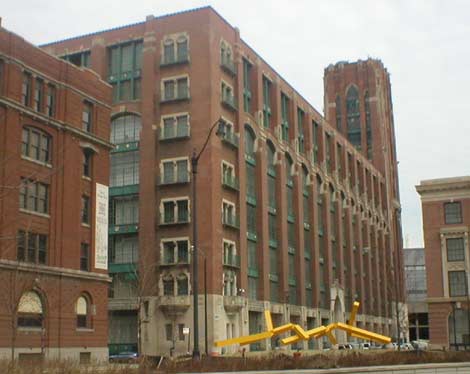Wired for Business: Digital Realty Boosts Connectivity at its Data Center HubsWired for Business: Digital Realty Boosts Connectivity at its Data Center Hubs
Digital Realty will build dark fiber infrastructure to connect its key Internet gateways and data center buildings, making it easier and cheaper for customers to connect with the carriers and clouds of their choice.
April 26, 2013


350cermak-leed
Digital Realty's building at 350 East Cermak in Chicago, a key hub in the region's digital economy, and one of the most conencted buildings in the country. (Photo: Rich Miller)
The digital world is tied together by fiber. It runs under streets and sidewalks, through conduit underground and risers inside skyscrapers. Fiber connects the world's data centers, but sometimes a customer will need just the right cable transmitting bits to a specific provider or partner. And it doesn't always exist.
Digital Realty wants to fix that problem. The company will build dark fiber infrastructure to connect its key Internet gateways and data center buildings, making it easier and cheaper for customers to connect with the carriers and clouds of their choice.
Digital Realty will run high count dark fiber between buildings, allowing it offer a "plug and play" Gigabit Ethernet product as well as straight dark fiber cross-connects to customers, carriers and service providers campus-wide. Dark fiber is cabling that is in place but not yet carrying customer traffic. Having dark fiber already in place between physical locations allows customers to "light" unused cabling, enabling traffic to flow without having to dig up streets and sidewalks to lay new fiber.
For Digital Realty's enterprise-heavy customer base, the initiative will simplify the deployment of hybrid environments, enabling private clouds within data centers to easily connect with public cloud providers. It will also ensure that customers have easy access to their choice of carriers and can easily create direct connections with high-traffic Internet destinations like social networks and video hubs.
"The launch of this important strategy takes our global portfolio to the next level in terms of network connectivity, which is a key factor for customers when selecting a data center provider," said Michael Foust, chief executive officer of Digital Realty. "When combined with our scale, expertise and global footprint, this initiative will give customers a one-stop shop for all of their data center needs."
Foust made it clear that by making dark fiber available, Digital Realty won't be competing with its customers.
"The important distinction here is that we are not building a network, nor are we becoming a reseller," said Foust. "The goal of this initiative is to ensure a robust offering of network and carrier products and services in every Digital Realty location, making our portfolio the easiest place for both wholesale and retail colocation customers to locate their data centers."
By offering friction-less fiber, Digital Realty removes the connectivity complexity from the decision-making process of choosing a data center provider. If a carrier isn't already "in the building," there's a cost involved in establishing that physical connection, which can change the economics of the deal. By building its own dark fiber infrastructure, Digital Realty is leveraging its financial strength to simplify this part of the site selection process, and gain an advantage over its growing field of rivals in the wholesale data center business.
The "Digital Realty Ecosystem" program will launch later this year in the company's major campus locations in the New York, London, Chicago, Boston, Ashburn, Va. and Santa Clara, Calif. It will then be expanded across the company's portfolio, which spans 22 million square feet of technology properties across three continents and 32 geographic markets.
The additional dark fiber capacity may prompt new business relationships between Digital Realty's customers, according to John Sarkis, vice president carrier and connectivity operations for Digital Realty and the architect of the plan.
"The Digital Realty Ecosystem is designed to give customers a neutral, efficient, and connectivity rich environment for our customers to connect, not only to any carrier of choice, but directly to one another," said Sarkis. "In addition, this ecosystem will provide an underlying infrastructure for carriers and service providers to deliver their entire portfolio of products and services to our customers, without the major capital intensive deployment costs hindering their business models."
About the Author
You May Also Like







